Starter Overhaul 28-MT
If the motor does not perform to specifications, disassembly
may be necessary in order to perform further testing of the components. Disassemble
the starter motor only as necessary in order to perform repair or replacement
of components.
Do not attempt to disassemble the following components that are serviced
as assemblies:
| • | The clutch drive assembly |
| • | The brush holder assembly |
| • | The frame and field assembly |
Caution: Wear safety glasses in order to avoid eye damage.
Preliminary Starter Motor Disassembly
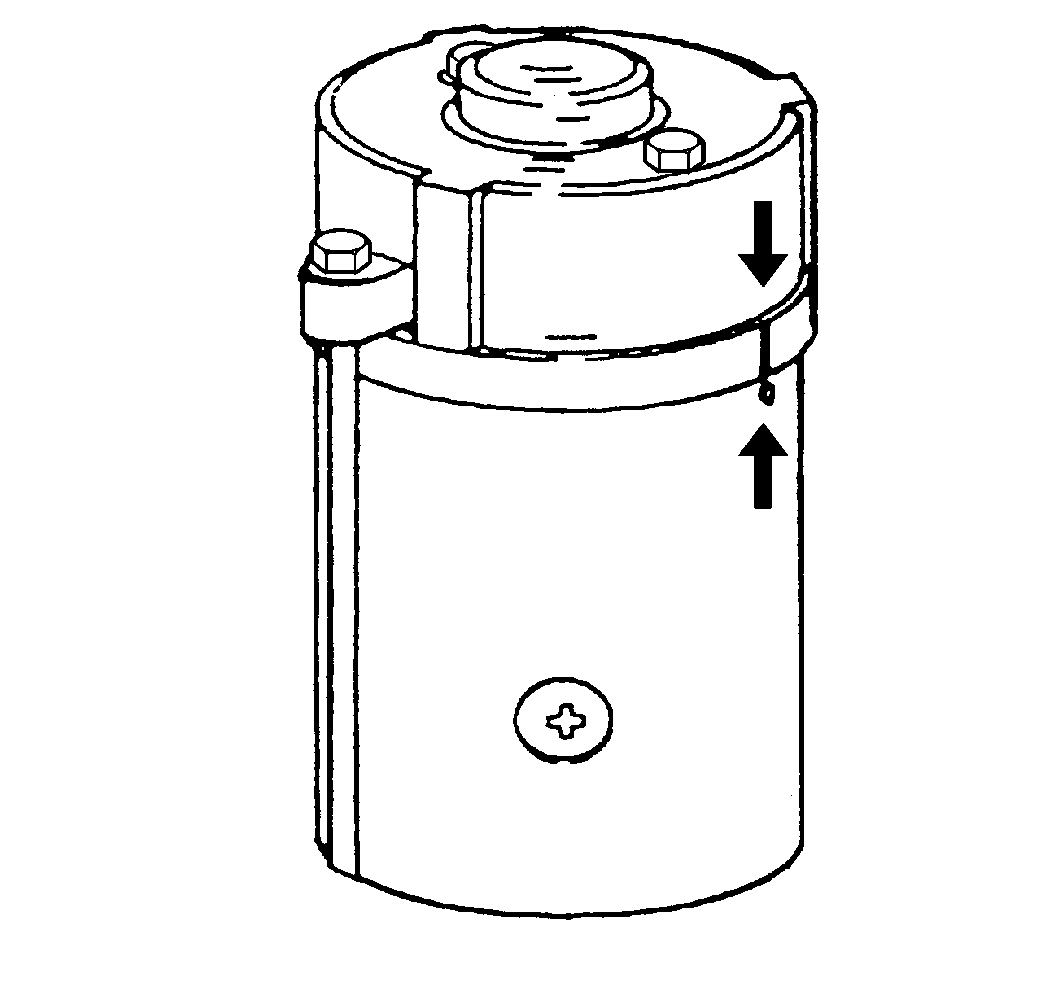
- Scribe marks completely
down one side of the starter motor in order to ensure proper alignment of
all of the components during assembly. Use a colored pencil or a marker
that will show on all of the components.
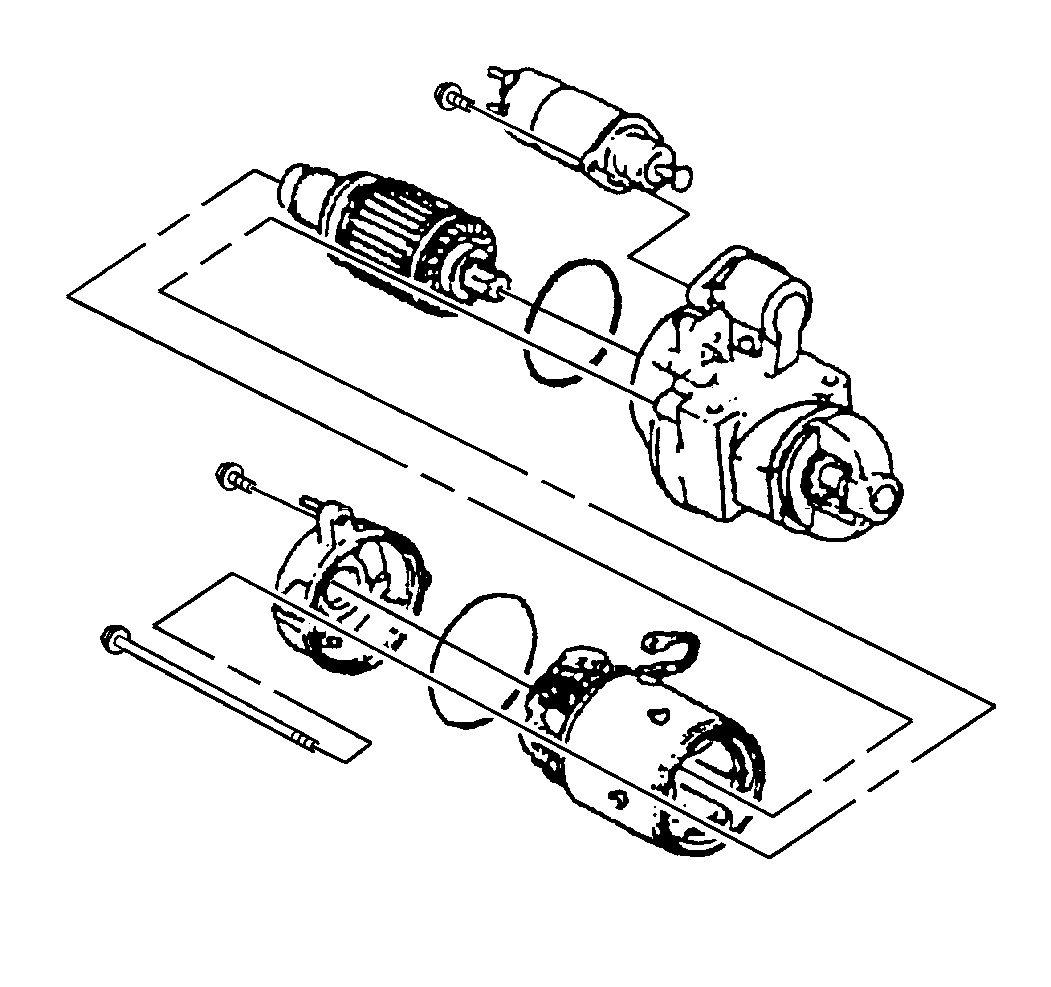
- Use the following procedure
in order to remove the motor lead on the frame assembly from the solenoid
assembly:
| 2.1. | Remove the nut from the motor terminal. |
| 2.2. | Slip off the motor lead. |
- Remove two through-bolts.
- Remove two brush plate screws.
- Remove the commutator end frame and O-ring seal.
Important: Do not lose the small dowel pin that is installed between the frame
assembly and the gear reduction and drive group. The dowel pin is necessary
for assembly. If the dowel pin is lost, replace the dowel pin with a 2 mm
X 10 mm (0.79 in X 0.394 in) long pin. Obtain the
new pin or manufacture the pin locally.
- Remove the following components:
| • | The armature may come off with the frame, field and brush holder group
or the gear reduction and drive group. |
- Remove the armature assembly that has the bearings.
Do not remove the bearings from the armature assembly unless replacement
of the bearings is necessary.
- Remove the solenoid screws.
- Remove the solenoid assembly.
Pivot the inside end of the solenoid assembly out of the engagement
shift lever drive group in order to withdraw the solenoid assembly.
Frame and Field Disassembly
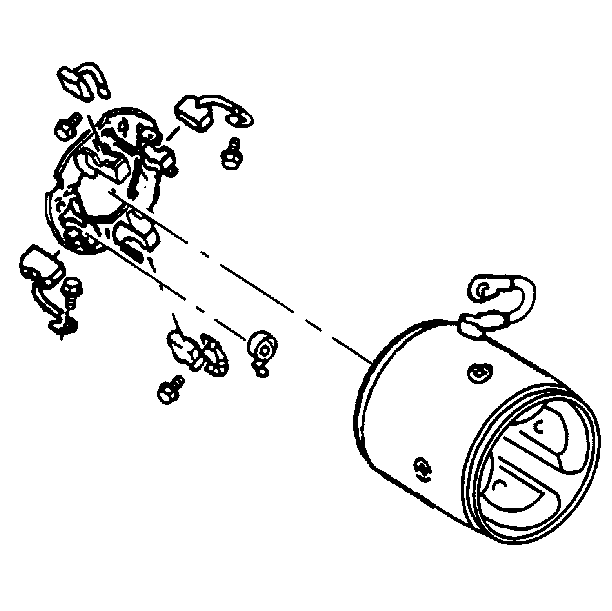
- Disassemble the insulated
brush screws. Move the brush holder assembly with the brushes slightly away
from the frame and the field assembly in order to reach across with a screwdriver
and remove the screws.
- Disassemble the frame and the field assembly.
- Disassemble the grounded brush screws.
- Disassemble the brushes if the brushes need replacement.
- Use the following procedure in order to disassemble the brush
springs if the brush springs need replacement:
| 5.1. | Grasp the brush end of each brush spring with needle nose pliers. |
| 5.2. | Twist the spring end away from the brush and remove the brush. |
Reduction and Drive Group Disassembly
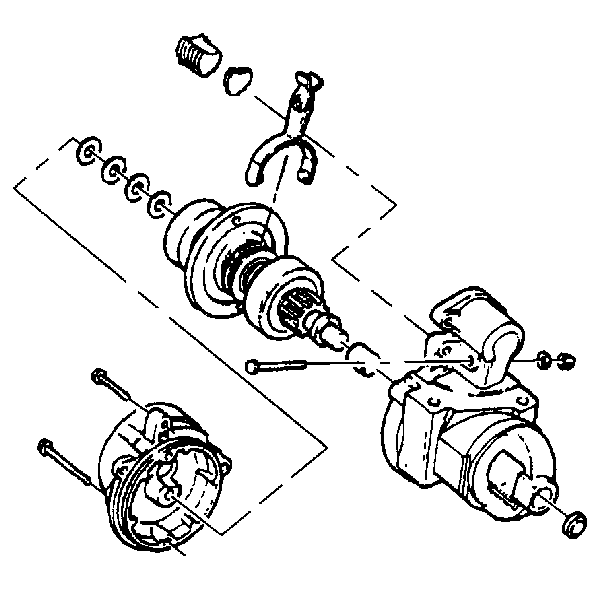
- Disassemble the housing bolts.
- Disassemble the armature support bracket.
Important: Washers may stick to the bracket or to the driveshaft and the clutch
group as the bracket is removed. In either case, note the position and number
of each of these washers.
- Disassemble the washers.
- Disassemble the drive housing plug and plate. Pry out the housing
plug with a large flat-bladed tool.
- Disassemble the following components:
- Disassemble the shift lever and driveshaft and clutch group from
the drive housing together, then separate these components. Do not remove
the bushing plug or the bushing from the drive housing unless replacement
is necessary.
Driveshaft and Clutch Disassembly
Disassembly of the driveshaft and clutch group is not required unless
it is necessary to clean, inspect, or replace one or more parts of the group
separately.
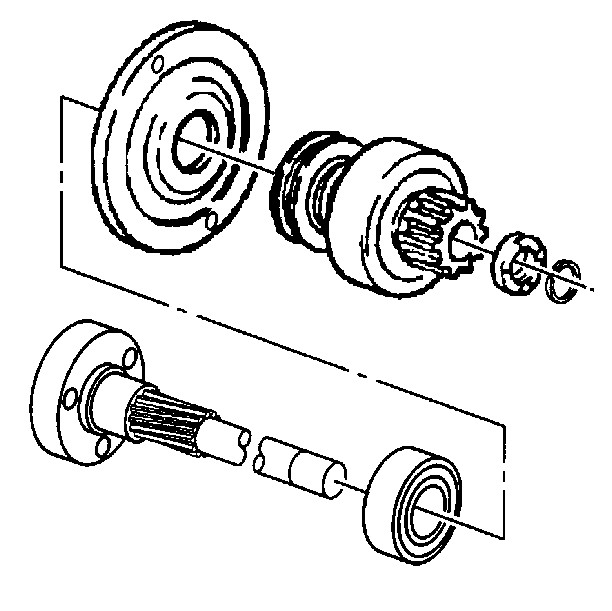
- Disassemble the stop rings and the pinion stop.
- Position the driveshaft and clutch group on a work bench with
the internal gear end down.
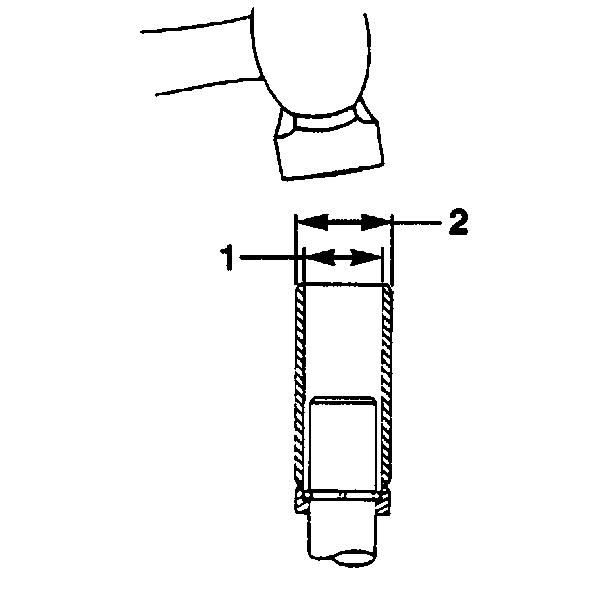
- Fabricate a tube approximately 22 mm wide (2). Drive the pinion
stop toward the clutch drive assembly until the pinion stop clears the stop
rings.
- Pry the stop rings out of the driveshaft groove and slide the
stop rings off the end of the shaft. Do not scratch the driveshaft.
- Inspect the edges of the shaft groove for burrs that may have
been formed through repeated cranking cycles. These burrs may make removal
of the pinion stop and clutch drive assembly difficult.
- Slide the pinion stop off the driveshaft. Discard the old pinion
stop and stop rings. Use new components for assembly.
- Disassemble the driveshaft support from the driveshaft. Do not
remove the bearing from the driveshaft unless replacement is required.
Armature Bearing Removal
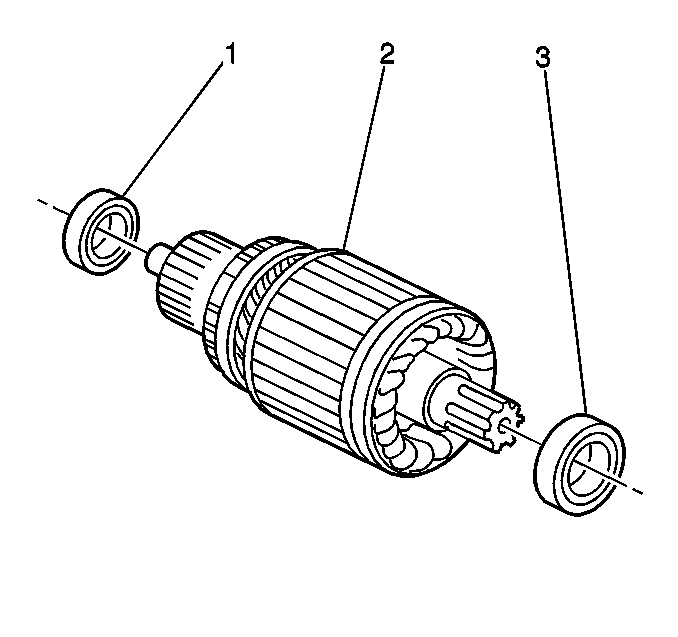
- Remove the armature bearings (1,
3) and the armature (2) if replacing the armature and bearings is
necessary.
Notice: Ball bearings that are removed from the armature must be replaced with
new bearings. The removal procedure causes internal damage to the bearings.
- Use a suitable bearing puller in order to remove the commutator end
or drive end bearings from the armature assembly.
Armature Bearing Installation
- Use a tube that bears only on the bearing inner race in order
to install the new commutator end and/or drive end bearings to the armature
assembly.
- Press on the bearing until the inner race bottoms out against
the shoulder of the armature shaft.
- Install the armature and armature bearings.
Center Support Bearing Removal
Tools Required
Locally Fabricated Tool
Use the following procedure in order to remove the center support bearing
from the driveshaft if the center support bearing needs replacement:
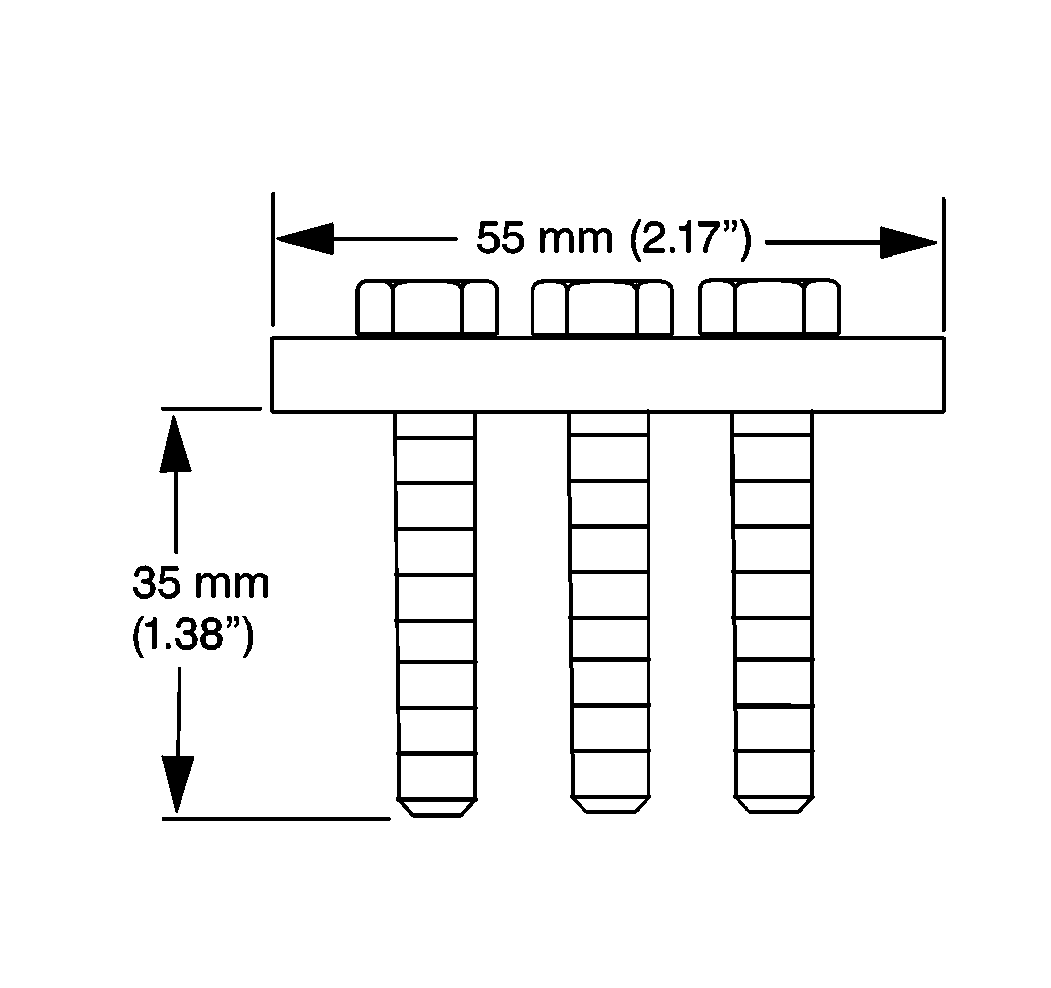
- Inspect the center support
bearing in order to determine if the center support bearing needs replacement.
- Proceed with the following steps if the center support bearing
needs replacement.
- Fabricate a tool for removing the center support bearing
using the dimensions shown.
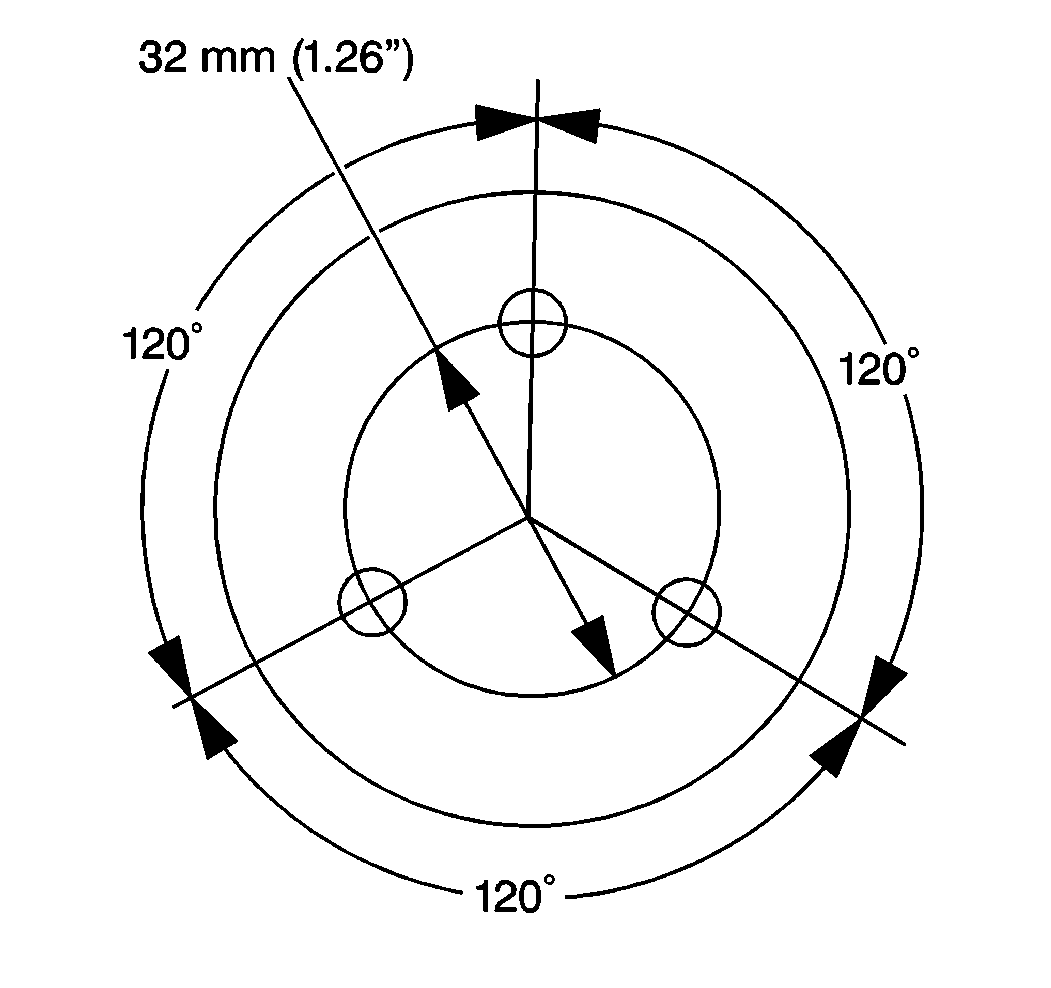
- Place the bolts in the
fabricated tool as shown.
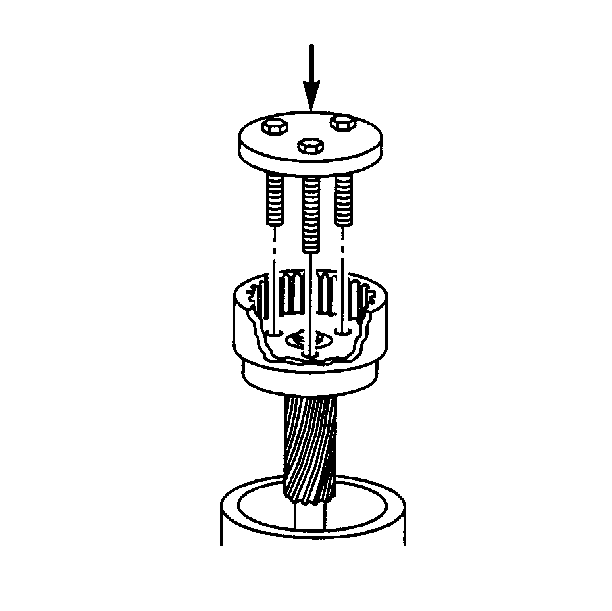
- Place the driveshaft in
a suitable support fixture.
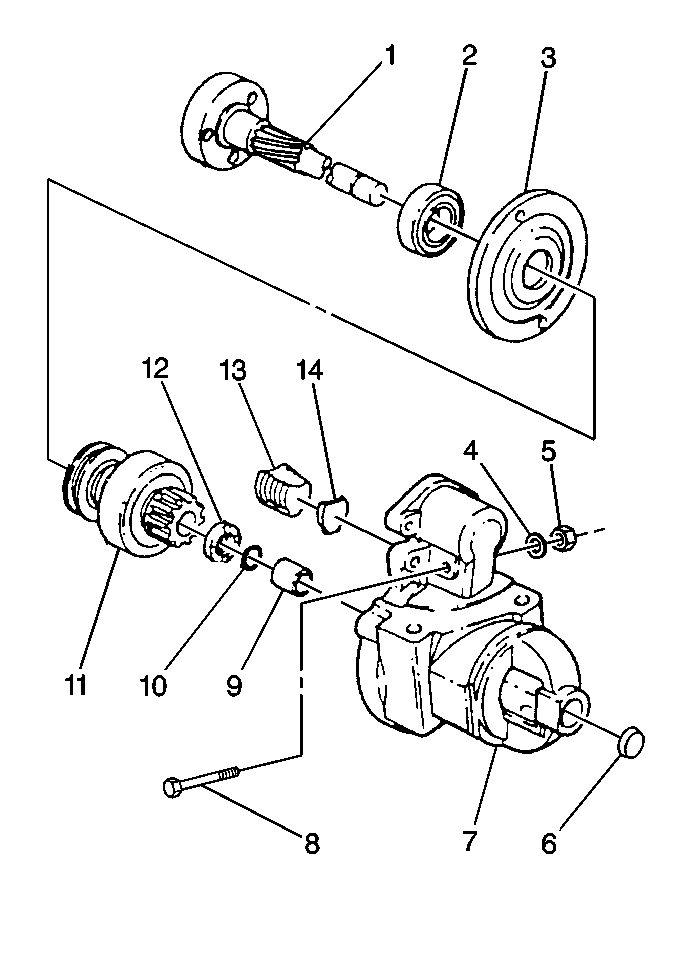
Notice: Ball bearings that are removed from the armature must be replaced with
new bearings. The removal procedure causes internal damage to the bearings.
- Place the bolt ends of the locally fabricated tool through the access
holes in the wide end of the driveshaft. (1)
- Squarely press the bearing off the surface on the center shaft.(3)
Center Support Bearing Installation

- Install the new bearing
into the driveshaft using the locally fabricated tool that bears only on the
bearing inner race.
- Press on the bearing until the inner race bottoms out against
the shoulder on the driveshaft.
Drive End Housing Bushing Removal

- Inspect the drive end
housing bushing (9) in order to verify if the drive end housing bushing
needs replacement.
- Use the following procedure in order to remove the drive end housing
bushing (9) from the drive end housing (7) if the drive end
housing bushing needs replacement.
| 2.1. | Drive out the plug, if present, from inside the drive housing. |
| 2.2. | Use a file to clean away remnants of the old stake and any metal
shavings in order to prepare for installation of a new plug. |
| 2.3. | Use a suitable tool in order to press out the bushing. |
Drive End Housing Bushing Installation
- Use a suitable tool in order to press the new bushing into the
drive housing until the bushing is flush with the inside of the housing.
- Install a new plug, if used, in the drive housing.
- Stake the housing material over the plug at three places, equally
spaced.
Lubrication Procedure
Armature bearings and the driveshaft support bearing are permanently
lubricated. Do not add lubricant to these bearings. Use GM P/N 1960954
grease lubricant or the equivalent in order to lubricate the
following areas during assembly. Avoid using excessive lubrication.
| • | The drive end housing bushing in the drive housing |
| • | The pivot hole and working surface on the ends of the shift lever |
| • | The following components on the driveshaft: |
Driveshaft and Clutch Assembly
If disassembled, position the driveshaft on a work surface with the
internal gear end down. Assemble the driveshaft and clutch group in the following
way:

Important: If the center support bearing is being replaced, install the center
support bearing on the driveshaft.
- Install the driveshaft support to the driveshaft, seating the bearing
in the support.
- Install the clutch drive assembly to the driveshaft.
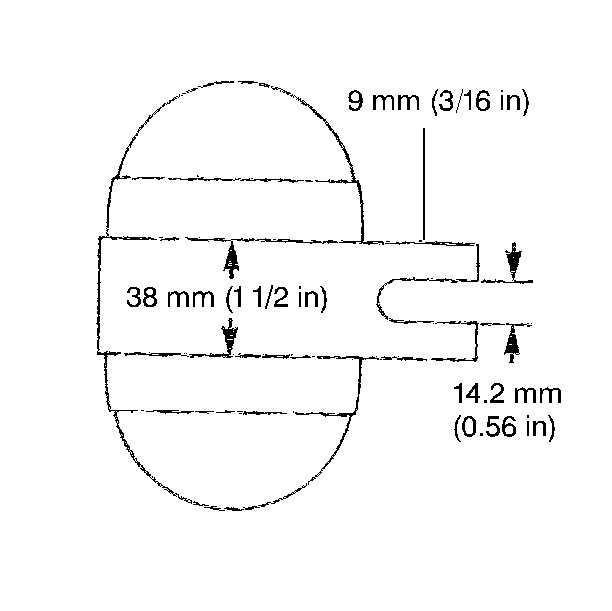
- Install the new pinion
stop onto the driveshaft.
| • | Slide the pinion stop onto the driveshaft until the recess for
the stop rings faces up. |
| • | Install the stop rings into the groove in the driveshaft. |
| • | Pick the assembly up and support the assembly under the pinion
stop. A metal block, with a U-shaped cutout that will slide over the shaft
between the pinion gear and stop, can be clamped in a vise to provide support. |
| • | Ensure that the stop rings are fully seated in the pinion stop
recess. |
| • | Stake the upper edge of the pinion stop over the stop ring at
four equally spaced places. |
| • | Do not allow the staked metal to contact the driveshaft. |
Reduction and Drive Group Assembly

Important:
| • | If the drive end bushing and plug are being replaced, install
these components into the drive housing. |
| • | Lubricate the following components: |
| • | The drive end housing bushing |
- Install the arms on the shift lever with the shift collar onto the driveshaft
and clutch group.
- Install the assembled shift lever and the driveshaft and clutch
group into the drive housing.
| • | Align the holes in the driveshaft support with the holes in the
drive housing. |
| • | Ensure that the driveshaft support fully seats in the drive housing
and that the driveshaft bearing remains fully seated in the driveshaft support. |
Notice: Use the correct fastener in the correct location. Replacement fasteners
must be the correct part number for that application. Fasteners requiring
replacement or fasteners requiring the use of thread locking compound or sealant
are identified in the service procedure. Do not use paints, lubricants, or
corrosion inhibitors on fasteners or fastener joint surfaces unless specified.
These coatings affect fastener torque and joint clamping force and may damage
the fastener. Use the correct tightening sequence and specifications when
installing fasteners in order to avoid damage to parts and systems.
- Install the following components:
Tighten
Tighten the nut to 4.5 N·m (40 lb in).
- Install the plate, if used, and the drive housing.
- Install the washers in the same number and position as noted at
disassembly.
- Install the armature support bracket to the drive housing. Align
the mark made prior to disassembly with the mark on the drive
housing.
- Install the drive housing.
Tighten
Tighten the drive housing bolts to 8.5 N·m (75 lb in).
Frame and Field Assembly
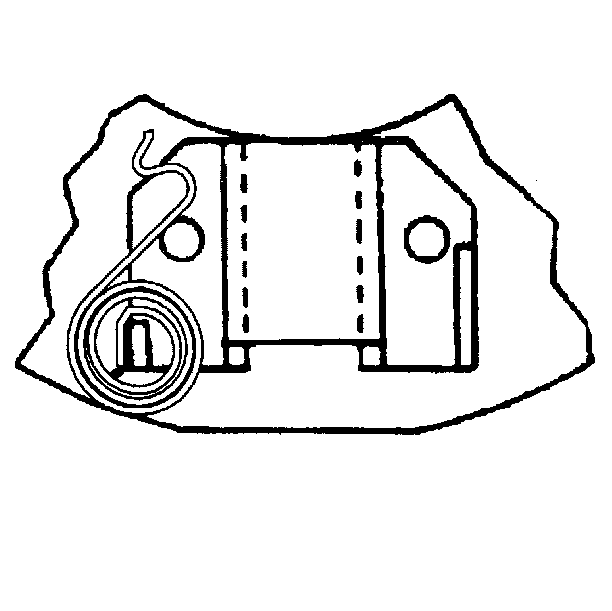
- Install the brush springs
if removed.
| 1.1. | Start each brush spring onto the post on the brush holder assembly
just enough to hold the inside end of spring from turning. |
| 1.2. | Grasp the free end of the spring with needle nose pliers and twist
it to the right over the top of the brush socket. |
| 1.3. | Push the spring fully onto the post then release the free end
to engage the notch in the brush socket. |
Notice: Brush leads may be damaged by excessive handling. Do not overflex the
leads near the clip welds or the clips may break
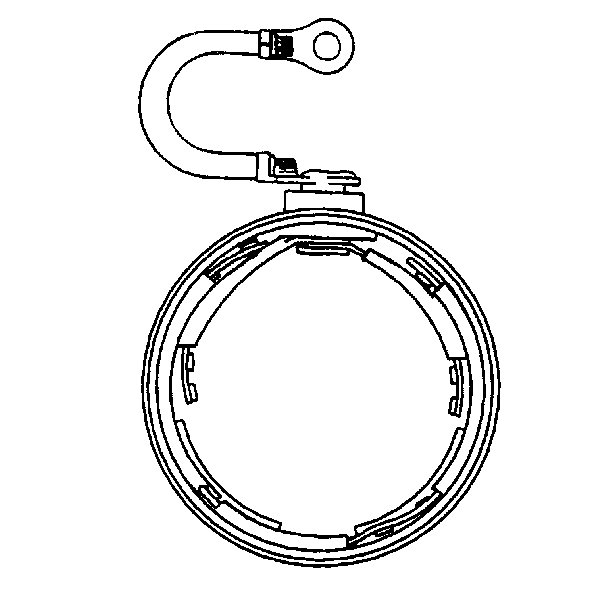
- Install brushes, if they
were removed.
| 2.1. | Ensure that the insulated brushes go into the brush sockets of
the brush holder assembly that mounts on the insulation. |
| 2.2. | To install each brush, grasp the free end of the brush spring
with needle nose pliers, twist it to the right to clear the brush socket,
then insert the brush partly into the brush socket. |
| 2.3. | Gradually release the springs so that its end contacts the side
(not end) of the brush. This will hold the brushes retracted until after the
brush holder is installed over the armature commutator. |
Notice: Use the correct fastener in the correct location. Replacement fasteners
must be the correct part number for that application. Fasteners requiring
replacement or fasteners requiring the use of thread locking compound or sealant
are identified in the service procedure. Do not use paints, lubricants, or
corrosion inhibitors on fasteners or fastener joint surfaces unless specified.
These coatings affect fastener torque and joint clamping force and may damage
the fastener. Use the correct tightening sequence and specifications when
installing fasteners in order to avoid damage to parts and systems.
- Install the grounded
brush screws.
| 3.1. | Position the terminals of the grounded brush leads behind the
terminal tabs on the brush holder. |
| 3.2. | Insert the brush screws through the terminal tabs on the brush
holder and thread them into the brush lead terminals. |
Tighten
Tighten the grounded brush screws to 1.5 N·m (13 lb in).

- Install the
frame and field assembly to the brush holder assembly.
| 4.1. | Position the brush holder assembly (with installed brushes) over
the terminal end of the frame and field assembly. |
| 4.2. | Attach the terminals of the insulated brush leads to the conductors
in the frame and field assembly with the insulated brush screws. |
Tighten
Tighten the insulated brush screws to 1.5 N·m (13 lb in).
Starter Motor Unit Assembly

- Support the gear reduction
and drive group.
- Place the pinion gear end down.
Important: If you are replacing the armature bearings, install the bearings onto
the armature.
- Use the following procedure in order to install the solenoid assembly:
| 3.1. | Pivot the plunger of the solenoid assembly in order to engage
the plunger to the shift lever in the gear reduction and drive group. |
| 3.2. | Position the solenoid mounting flange. |
Notice: Use the correct fastener in the correct location. Replacement fasteners
must be the correct part number for that application. Fasteners requiring
replacement or fasteners requiring the use of thread locking compound or sealant
are identified in the service procedure. Do not use paints, lubricants, or
corrosion inhibitors on fasteners or fastener joint surfaces unless specified.
These coatings affect fastener torque and joint clamping force and may damage
the fastener. Use the correct tightening sequence and specifications when
installing fasteners in order to avoid damage to parts and systems.
| 3.3. | Install the solenoid
mounting screws. |
Tighten
Tighten the solenoid screws to 2.8 N·m (25 lb in)
- Install the frame seal.
- Use the following procedure in order to install the armature assembly
and the bearings into the gear reduction and drive group.
| 5.1. | Ensure that the teeth are aligned. |
| 5.2. | Seat the bearing on the armature shaft fully into the housing
recess. |
- Use the following procedure in order to install the frame, field
and brush holder group.
| 6.1. | Place the dowel pin into the hole in the armature support bracket
of the gear reduction and drive group. |
| 6.2. | Position the frame, field and brush holder group over the armature
assembly. |
| 6.3. | Align the hole for the dowel pin. |
| 6.4. | Align the marks made during disassembly. |
| 6.5. | Seat the frame, field and brush holder group into the gear reduction
and drive group. |
| 6.6. | Twist the brush springs away from the brushes. |
| 6.7. | Slide the brushes in order to contact the commutator on the armature. |
| 6.8. | Release the brush springs in order to contact the ends of the
brushes. |
| 6.9. | Verify that the brush spring tension is 44.5-49 N·m
(10-11 lb). |
| 6.10. | If the brush spring tension in not correct, replace the brush
springs. |
Important: The O-ring seal will damage easily during installation of the commutator
end frame. In order to prevent damage to the O-ring seal, take the following
steps.
- Use the following procedure in order to install the O-ring seal.
| 7.1. | Install the O-ring seal onto the frame, field and brush holder
group in the normal position. The O-ring seal is in the normal position when
the seal is against the shoulder on the field frame that will abut the installed
commutator end frame. |
| 7.2. | Carefully roll the O-ring seal out of the normal position and
up onto the major outer diameter of the field frame. |
| 7.3. | Allow the seal to remain on the outer diameter of the field frame
until the commutator end frame is partially installed. |

- Use the following procedure
in order to install
the commutator end frame.
| 8.1. | Align the marks on the commutator end frame and the frame and
field assembly made at disassembly. |
| 8.2. | Position the commutator end frame onto the frame and field assembly. |
| 8.3. | Leave a gap slightly larger than the thickness of the O-ring seal. |

- Use the following procedure
in order to install the brush plate screws.
| 9.1. | Use a scribe or a similar tool in order to align the tapped holes
in the brush holder assembly to the screw holes in the commutator end frame. |
| 9.2. | Install the brush plate screws. |
Tighten
Tighten the brush plate screws to 2.8 N·m (25 lb in).

- Use the following procedure
in order to install
the through-bolts.
| 10.1. | Position the through-bolts. |
| 10.2. | Tighten the through-bolts by hand, but do not close the gap between
the commutator end frame and the frame and field assembly where the O-ring
seal will be located. |
| 10.3. | Roll the O-ring seal down into the normal position. The normal
position is between the commutator end frame and the frame and field assembly. |
| 10.4. | Align the timing ribs on the edge of the commutator end frame
to the timing spots on the frame and field assembly in order to ensure proper
alignment of the brushes. |
| 10.5. | Although the marks are located in two places on the motor, the
marks will only match in one way. |
Tighten
Tighten the through-bolts to 8.5 N·m (75 lb in).

- Use the following procedure
in order to install the motor lead onto the frame and field assembly.
| 11.1. | Remove the nut from the terminal on the solenoid. |
| 11.2. | Install the motor lead terminal. |
| 11.3. | Reinstall the solenoid motor terminal nut. |
Tighten
Tighten the solenoid motor terminal nut to 11 N·m (100 lb in).
- Perform the starter motor No Load Test after overhauling the starter
motor. Refer to
Starter No Load Test
.
Starter Overhaul 37-MT
If the motor does not perform to specifications, it may
be necessary to disassemble the motor in order to further inspect the components.
Only disassemble the starter motor as necessary in order to perform repair
or replacement of defective components.
Caution: Wear safety glasses in order to avoid eye damage.
Prior to disassembly, electrically test the solenoid. Refer to
Starter Motor Inspection
.
Field Frame Disassembly
- Clean the outside of the starter housing.
Clean any of the following conditions:
- Scribe marks in order to show the relationship of the following
components:
| • | Scribing the above marks will aid in assembly. |
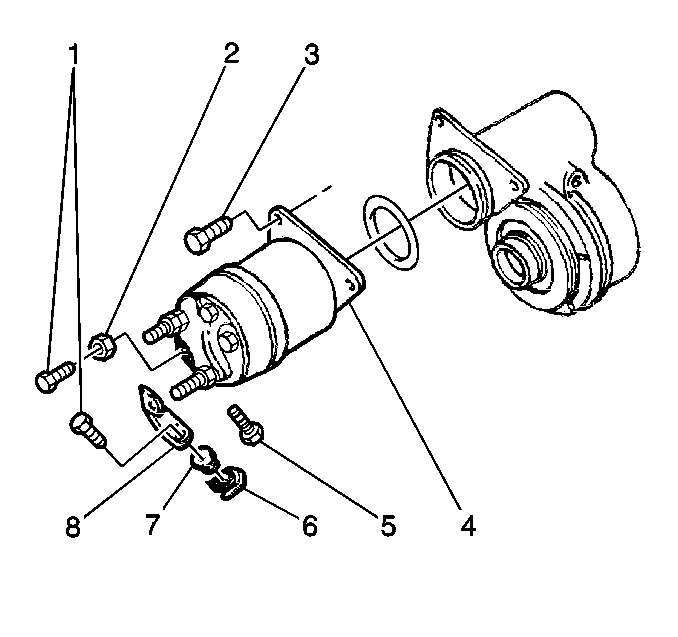
- Remove the field coil
terminal to solenoid connector (8) and two screws (1).
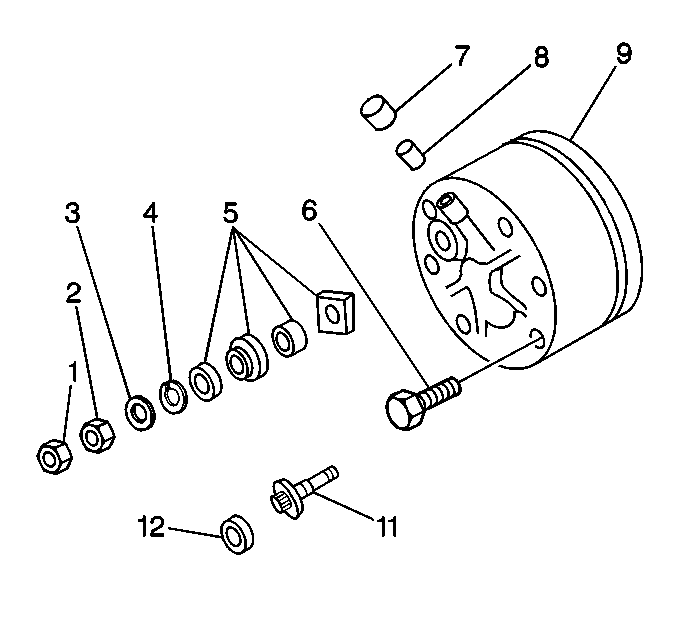
- Remove the following components
from the end frame:
| • | The terminal insulator (5) |
| • | The square insulator is located inside the end frame. |
- Remove the thermostat retaining ring (12) from the thermostat (11)
on starters with overcrank protection.
- Remove the four end frame screws (6).
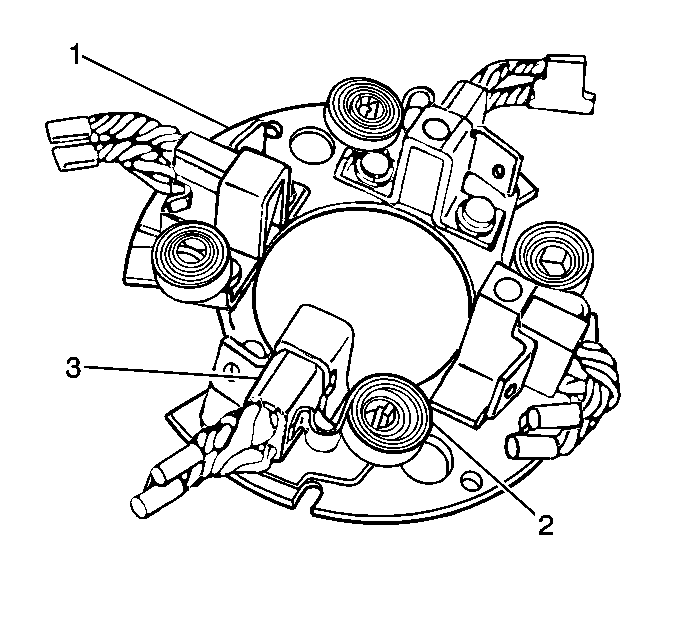
- Remove the end frame from
the field frame.
Hold the end of each brush spring (2) off the end of each brush (3)
while pulling the brush out of the guide. Only pull the brush out of the
guide enough in order to rest the spring against the side of the brush.
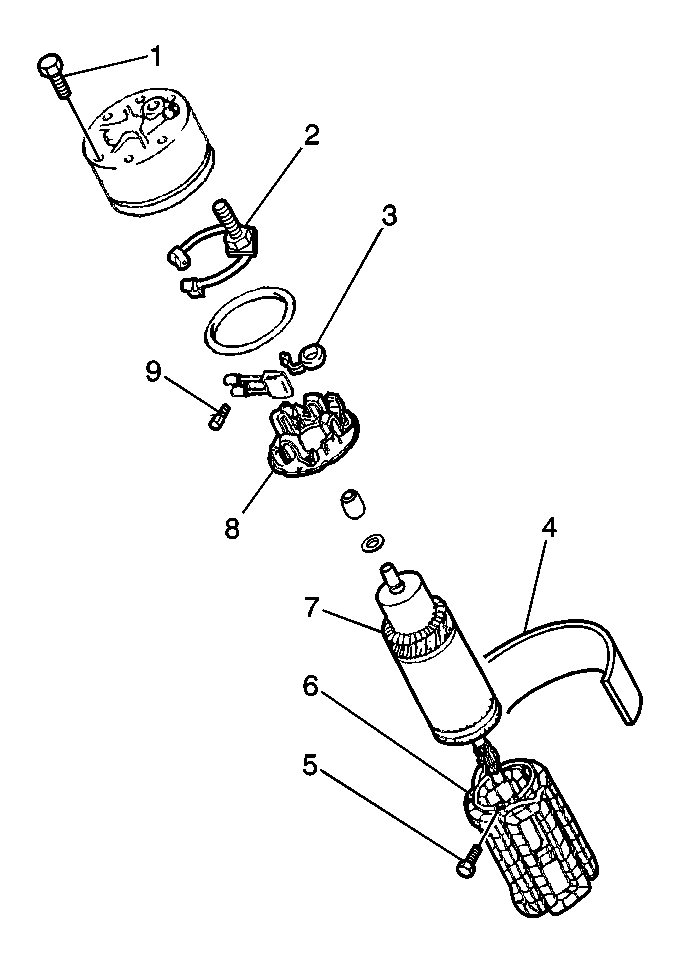
- Remove the brush attaching
screws (9) from the positive (insulated) brushes and field coil leads.
- Remove the brush plate assembly (8) and the terminal lead (2)
from the field frame.
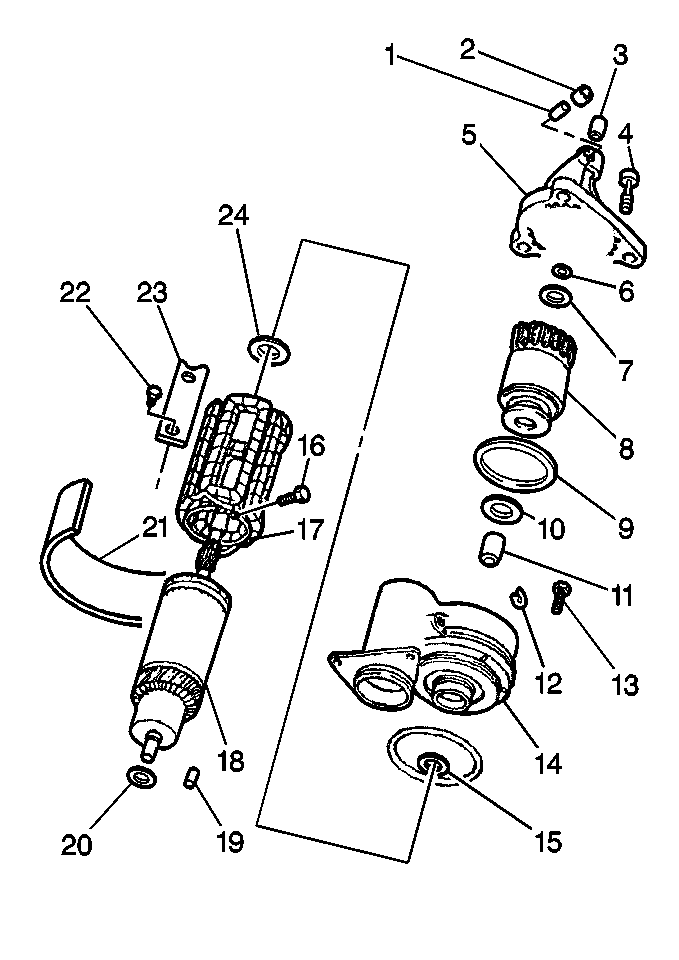
- Remove the drive housing
screws (4).
- Remove the drive housing (5).
- Remove the lever housing O-ring (9).
- Remove the five lever housing screws (13).
- Remove the lever housing (14).
Pry the lever housing away from the field frame.
- Remove the armature (18).
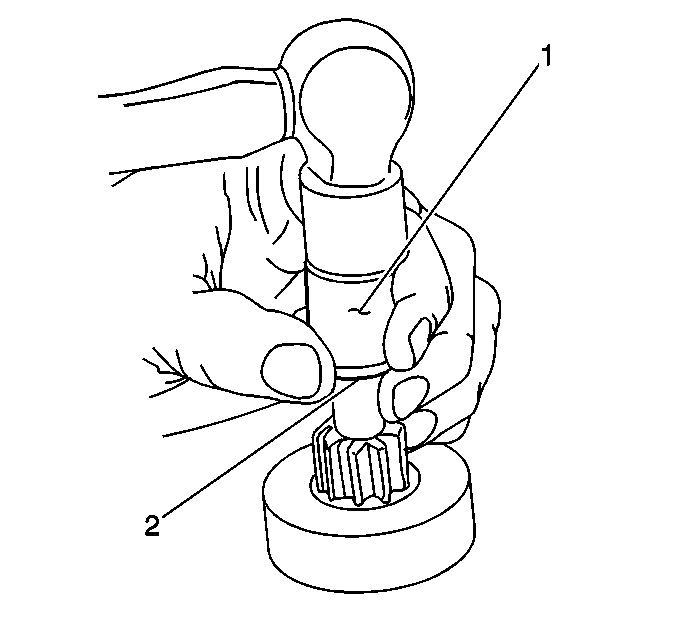
- Perform the following
procedure in order to remove the retainer ring and the pinion stop
from the armature shaft:
| 16.1. | Slide a metal cylinder (1) onto the armature shaft. |
| 16.2. | Use a hammer in order to strike the metal cylinder against the
retainer ring. |
| 16.3. | Use pliers in order to remove the snap ring (2) from the
groove in the shaft. |
If the snap ring becomes distorted during removal, replace the snap
ring.

- Remove the pinion stop (11)
from the armature shaft.
- Remove the thrust washer (20) from the commutator end of
the armature shaft.

- Remove three solenoid
to lever housing screws (3).
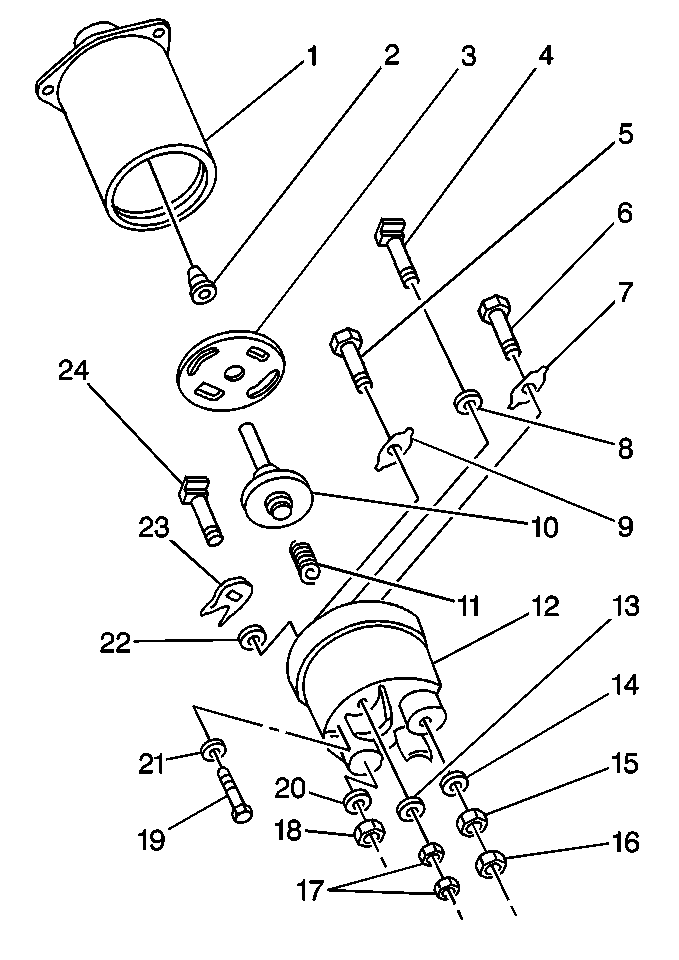
- Remove the solenoid (1).
Lever Housing Disassembly
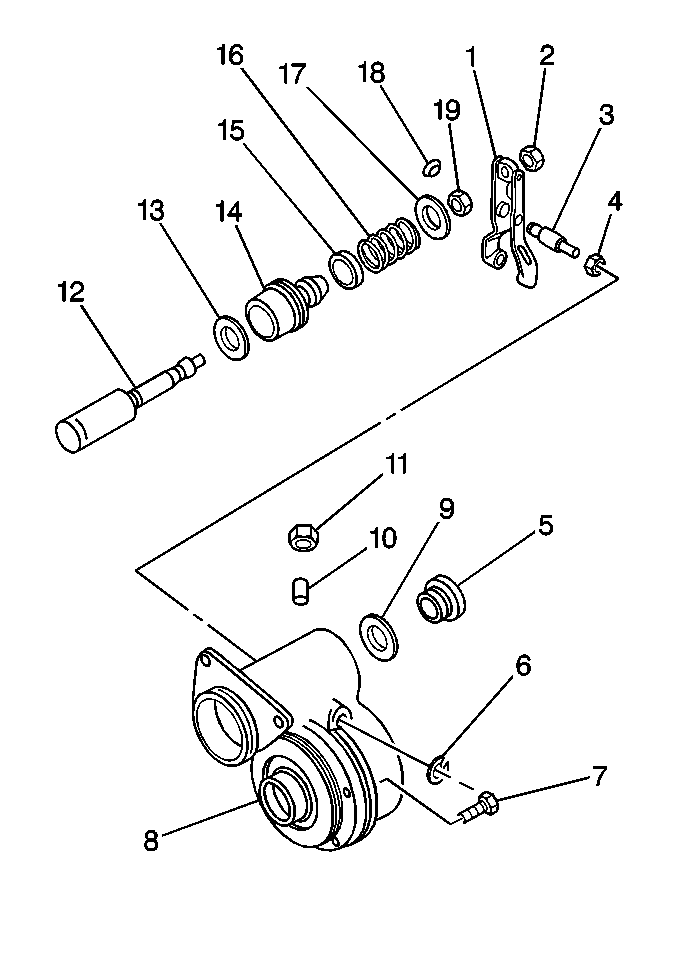
- Remove the inspection plug (5) from the lever housing (8).
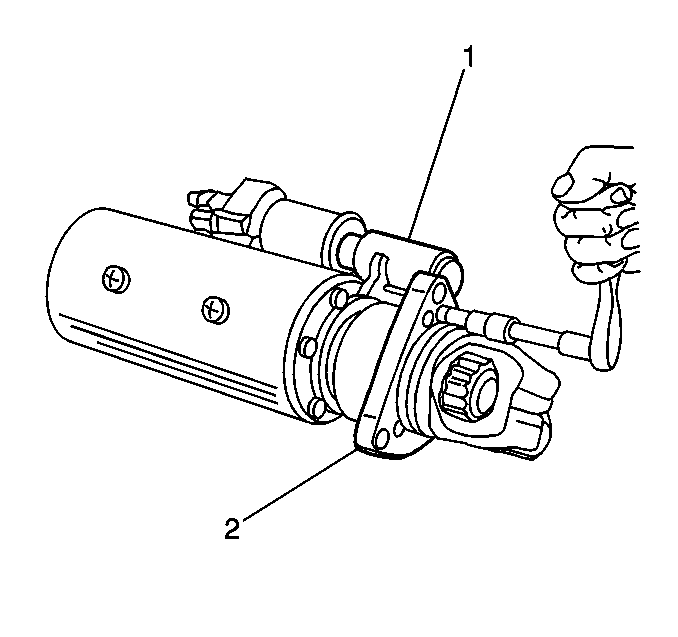
- Remove the drive assembly (2) from
the lever housing (1).

- Remove the shaft retainer ring (6) from the lever housing at the end
of the shift lever shaft (3).
Important: The retainer will bend during removal. Do not reuse the retainer.
- Remove the shift lever shaft (3).
- Remove the shift lever (2).
Field Coil Disassembly

Important: Inspect the field coil for grounds before removing the coil from the
frame. Refer to
Starter Motor Inspection
. Grounds may not appear after the field coil is removed.
- Remove the outer insulator (7) from the field frame.

- Remove the pole shoe screws (22) from
the field frame, including the frame grounding terminal 16 (if present).
- Remove the field coil insulator (21).
- Remove the following components from the field frame:

- Remove the inside insulator (6)
from the field terminal on the field coil.
Solenoid Boot Disassembly

- Remove the plunger spring retainer ring (19) from the plunger shaft (12).
- Remove the following components:
| • | The plunger spring retainers (15,17) |
- Remove the plunger boot (14).
Solenoid Disassembly

- Remove the two cover attaching screws (19).
- Remove the nuts (15, 16, 17) and the washers (21,
20) from the terminal studs.
- Remove the cover (1).
- Remove the solenoid contact (10).
- Remove the cover gasket (3).
- Inspect the gasket for damage. Replace the gasket if necessary.
- Inspect the following components for wear, corrosion or dirt:
| • | The bottom of the contact return stud (4) |
- Clean the contact points on the contact plate and the bottom of
the studs.
Solenoid Assembly

- Install the gasket (3).
- Install a new contact (10) and studs (4, 5,
24) if necessary.
- Install the cover (1).
Notice: Use the correct fastener in the correct location. Replacement fasteners
must be the correct part number for that application. Fasteners requiring
replacement or fasteners requiring the use of thread locking compound or sealant
are identified in the service procedure. Do not use paints, lubricants, or
corrosion inhibitors on fasteners or fastener joint surfaces unless specified.
These coatings affect fastener torque and joint clamping force and may damage
the fastener. Use the correct tightening sequence and specifications when
installing fasteners in order to avoid damage to parts and systems.
- Install two solenoid
screws (19).
Tighten
Tighten the solenoid screws to 3.5 N·m (30 lb in).
- Install the nuts (16, 17, 18) and the washers (20,
21, 22) to the studs (4, 5, 6, 24).
Solenoid Boot Assembly

- Install a new boot (14) on the plunger (12).
- Install the following components onto the plunger (12).
| • | The spring retainer (15) |
| • | The spring retainer (17) |
| • | The retaining ring (19) |
Field Coil Assembly

- Install the inner insulator to the field coil terminal (17).
- Use a pole shoe spreader if necessary in order to install the
field coils (17) and the pole shoes (23) into the field frame.
If the pole shoe has a long tip on one side and a short tip on the other
side, assemble the long tip in the direction of armature rotation. Refer to
the identification tag on the field frame for the direction of the pinion
rotation.
- Install the pole shoe screws (22) and the frame ground
terminal (16) (if used) through the field frame and into the pole shoes.
Finger tighten the pole shoes in order to allow insertion of the field
coil insulator (21).
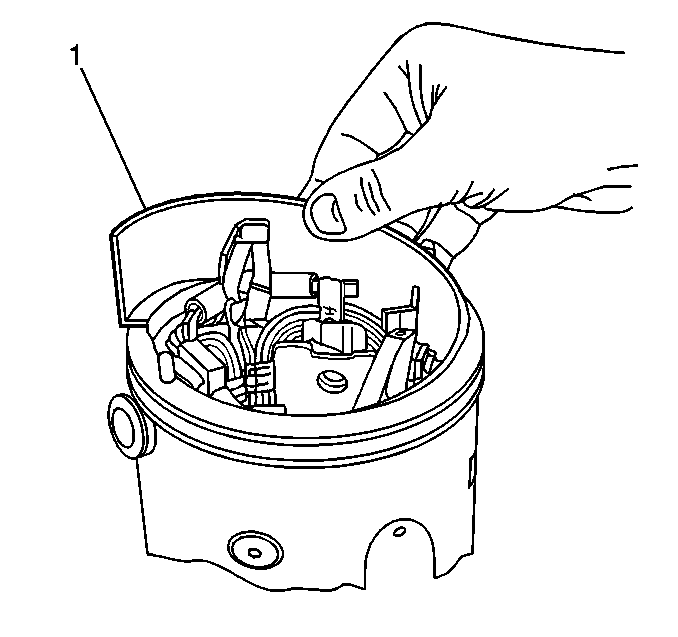
Notice: Use the correct fastener in the correct location. Replacement fasteners
must be the correct part number for that application. Fasteners requiring
replacement or fasteners requiring the use of thread locking compound or sealant
are identified in the service procedure. Do not use paints, lubricants, or
corrosion inhibitors on fasteners or fastener joint surfaces unless specified.
These coatings affect fastener torque and joint clamping force and may damage
the fastener. Use the correct tightening sequence and specifications when
installing fasteners in order to avoid damage to parts and systems.
- Install the field
coil insulator (1) to the left field frame.
Tighten
Tighten the pole shoe screws and the frame ground terminal (if used)
to 45 N·m (33 lb ft).
- Install the outer field coil terminal insulator to the field frame.
Starter Motor Unit Assembly

- Install the shift lever (2) in the lever
housing (8).
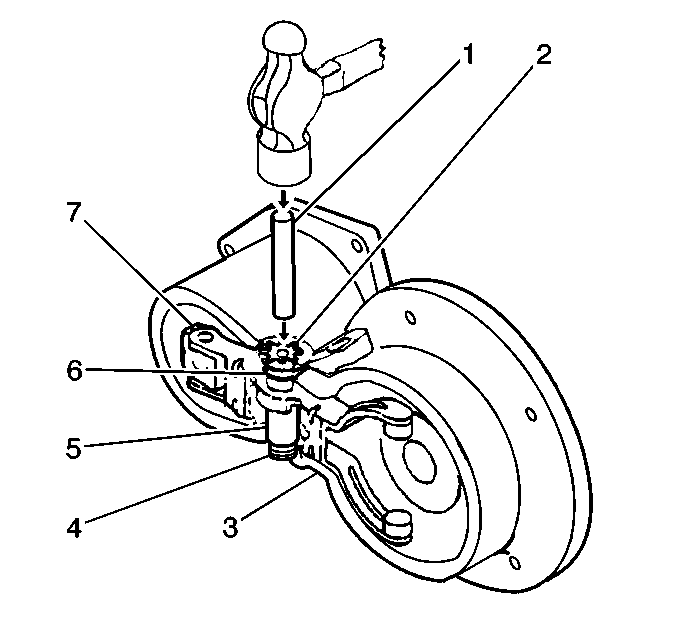
- Use the following procedure in order to install
the shift lever shaft (5) in the lever housing (3):
| 2.1. | Use the shaft retainer (2) in order to secure the shift
lever shaft. |
| 2.2. | Verify that the lever shaft is fully seated in the housing. Support
the housing. Use a 3/8 inch driver (1) and a hammer in order to drive
the retainer snugly against the end of the shift lever shaft. |

- Install the inspection plug (5) to the
lever housing (8).
- Install the solenoid plunger shaft (12) through the shift
lever trunnion (6).
- Install the plunger adjuster nut (1) to about the same
position on the shaft as prior to disassembly.

- Install new seals in the armature end of the
lever housing as necessary.
- Lubricate the armature and lever housing spacer (24). Refer
to
Starter Motor Inspection
.
- Install the spacer (24) onto the armature shaft.
- If the lever housing bushing (11) is being replaced, lubricate
the new wick and the new bushing. Refer to
Starter Motor Inspection
.

- Install the following components:
- Install the lever housing onto the armature shaft and field frame.
Be sure to align the marks scribed during disassembly.
Notice: Use the correct fastener in the correct location. Replacement fasteners
must be the correct part number for that application. Fasteners requiring
replacement or fasteners requiring the use of thread locking compound or sealant
are identified in the service procedure. Do not use paints, lubricants, or
corrosion inhibitors on fasteners or fastener joint surfaces unless specified.
These coatings affect fastener torque and joint clamping force and may damage
the fastener. Use the correct tightening sequence and specifications when
installing fasteners in order to avoid damage to parts and systems.
- Install the five
lever housing mounting screws.
Tighten
Tighten the lever housing screws to 20 N·m (15 lb ft).

- Install the following components onto the armature
shaft (18):
- Install the pinion stop (7).
The flat side of the pinion stop must face toward the pinion.
- Place the retaining ring (6) on the end of the shaft.
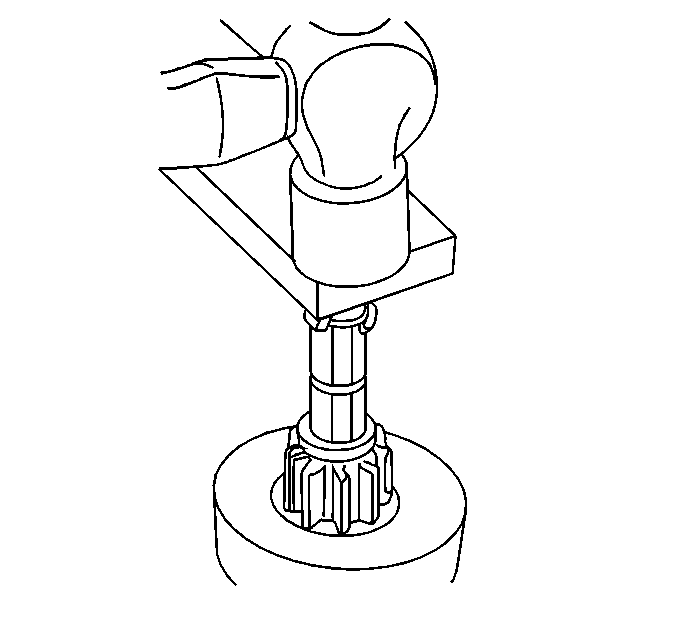
- Use a light
hammer blow against a wood block on top of the retaining ring in order to
force the ring onto the shaft.
- Slide the ring down into the shaft groove.

- Tap the pinion stop (7) up over the retaining
ring (6).
- If replacing the drive housing bushing (3), lubricate the
new wick and the new bushing. Refer to
Starter Motor Inspection
.
- Install the following components into the drive housing (5):
- Install the drive housing (5) into the lever housing (14).
Be sure to align the marks scribed during disassembly.
- Install the drive housing mounting screws (4).
Tighten
Tighten the drive housing mounting screws to 24 N·m (18 lb ft).
- Install the thrust washer (20) onto the armature shaft
at the commutator end.

- Perform the following procedure in order to install
the new brushes (3), if needed, and springs (2) to the brush
plate assembly (1):
| 24.1. | Install each brush spring in the following manner: |
| • | The plate assembly post is inside the innermost loop of the spring. |
| • | The free end of the spring is located toward the center of the
plate assembly. |
| 24.2. | Place the brush into the holder in the plate assembly in the following
manner: |
| • | The flat side of the brush clip is down under the brush screw. |
| • | The plain end of the brush is even with the bottom of the holder. |
| 24.3. | Use needle nose pliers in order to pull the free end of the brush
spring past the holder and place the spring against the side of the brush. |
The above action will hold the brush in a retracted position for further
motor assembly.

- Use the brush attaching screws (9) in
order to install the terminal assembly (2) and the thermostat (if
present) to the grounded (negative) brush holders and the brush leads.
Place the terminal leads between the brush holders and the brush clips.
Tighten
Tighten the brush attaching screws to 3.4 N·m (30 lb in).
- Install the brush plate assembly (8) to the field frame.
- Use the brush attaching screws (9) in order to install
the field coil leads to the grounded (negative) brush holders and the brush
leads.
Place the field leads between the brush holders and the brush clips.
Tighten
Tighten the brush attaching screws to 3.4 N·m (30 lb in).
- Perform the following procedure in order to release the brushes
onto the commutator:
| 28.1. | Pull back each brush spring |
| 28.2. | Push each brush into the holder until the brush rests against
the commutator. |
Verify that the brushes move freely in the holders. Verify that the
brush tension holds the brushes flat against the commutator
| 28.3. | Release the spring onto the end of the brush. |
| 28.4. | Verify that the braided copper brush leads on the insulated (positive)
brushes do not touch any ground source around the brush holder. |
- If replacing the end frame bushing , lubricate the new wick and
the new bushing. Refer to
Starter Motor Inspection
.

- Install the following components into the end
frame (9):

- Install the end frame into the field frame.
Be sure to align the marks scribed during disassembly.
- Install the four end frame screws (1).
Tighten
Tighten the end frame screws to 5.6 N·m (50 lb in).

- Use three solenoid mounting screws (3)
in order to install the solenoid (4) to the lever housing.
Tighten
Tighten the solenoid mounting screws to 18 N·m (13 lb ft).
- Inspect the mounting nuts on the large solenoid M and BAT terminals
in order to verify that the terminals are secure.
Tighten
Tighten the solenoid terminal nuts to 30 N·m (22 lb ft).
- Use two screws (1) in order to install the connector (8)
to the field terminal and the solenoid M terminal.
Tighten
Tighten the terminal screws to 3.4 N·m (30 lb in).
- Inspect the mounting nuts on the solenoid S terminal and ground
terminals (if present) in order to verify that the terminals are secure in
the cap.
Tighten
Tighten the solenoid terminal nuts to 3.0 N·m (27 lb in).

- If a ground lead is used between the solenoid
terminal and the commutator end terminal (type 350 only), inspect the nut (2)
on the ground lead to the solenoid ground terminal.
- Hold the mounting nut (next to the cap) in order to prevent the
mounting nut from turning when tightening the outer terminal nut.
Tighten
Tighten the terminal nut to 3.0 N·m (27 lb in).
- Install the thermostat retaining ring (12) to the thermostat
connector (if present).
- Install the commutator terminal mounting nut (1) to the
commutator end ground terminal.
Tighten
Tighten the mounting nut to 30 N·m (22 lb ft).
- Install a ground lead from the commutator end terminal to the
solenoid (type 350, if used) outer nut (1).
- Hold the mounting nut (next to end frame) in order to prevent
the mounting nut from turning when tightening the outer terminal nut.
Tighten
Tighten the terminal nut to 30 N·m (22 lb ft).



























































